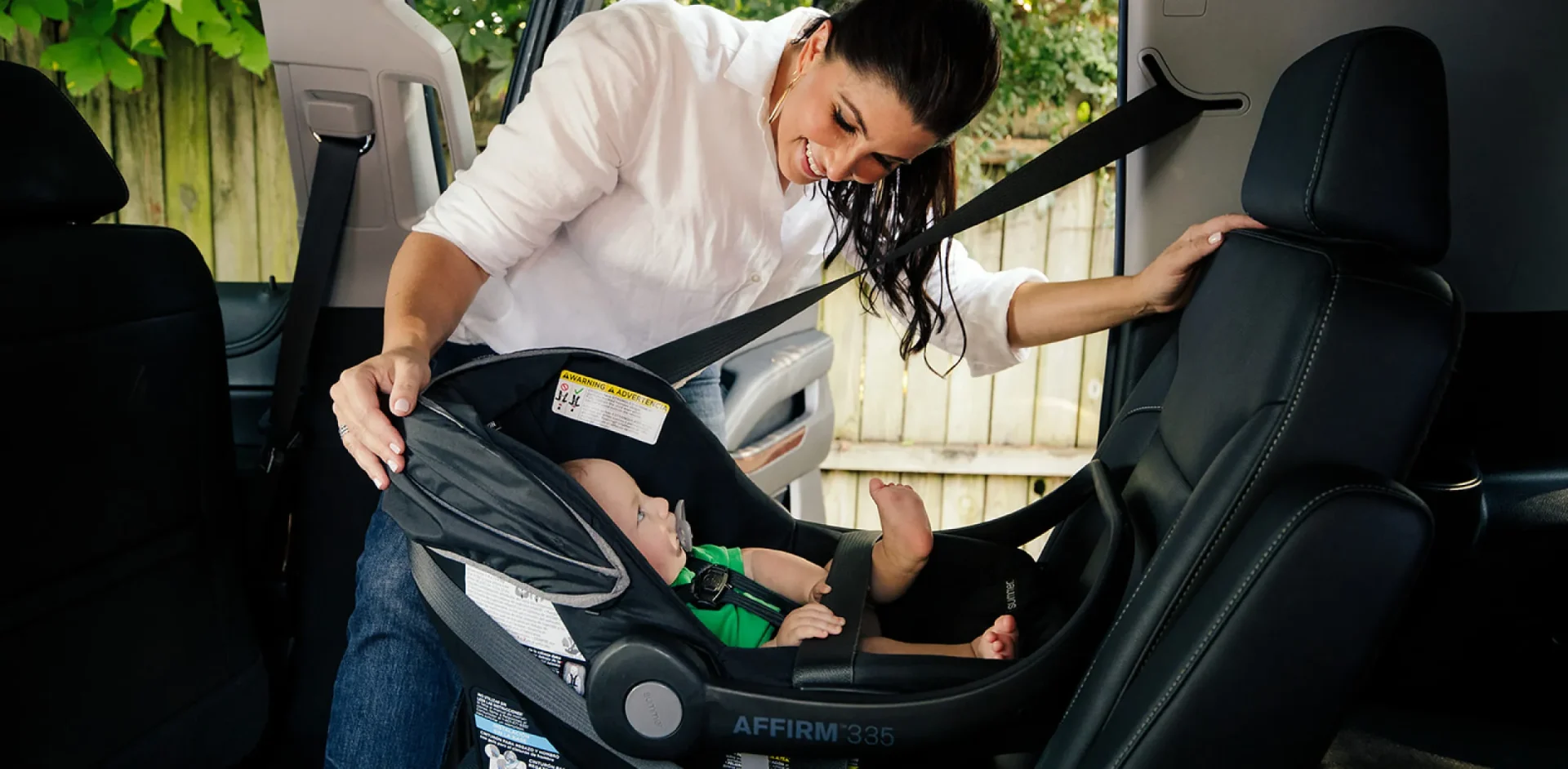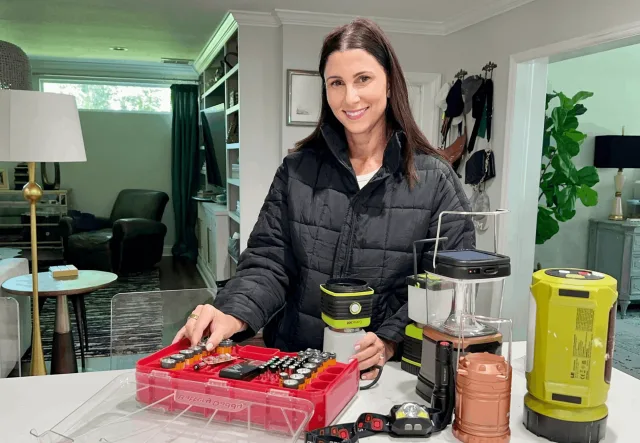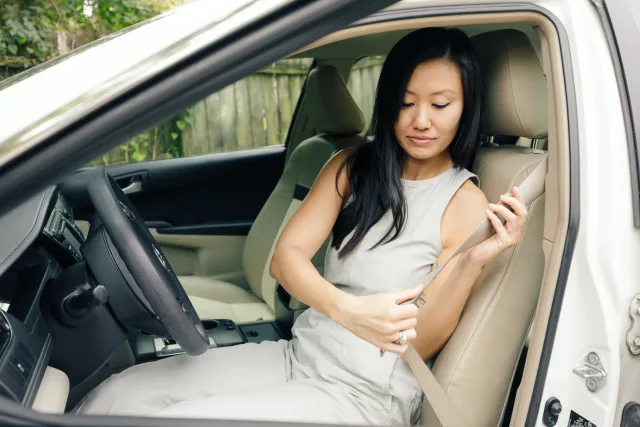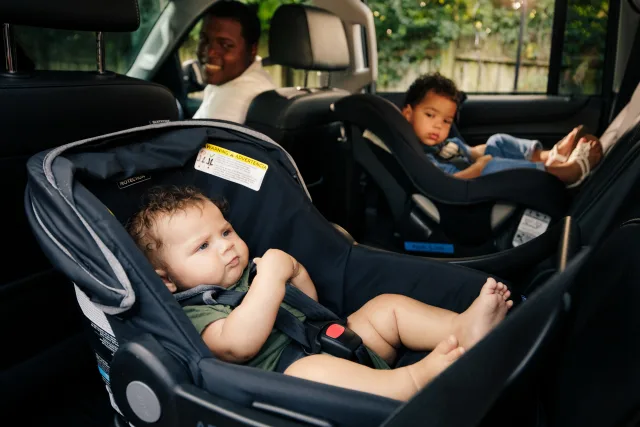Have a kid outgrow the seat and passing down a car seat from oldest to youngest kiddo? To a friend with a new babe? Good news, you’re a saint. Bad news, for the safety of your child, car seats expire — most car seats bite the dust anywhere from six to ten years after the manufacture date. There are a few that expire from the date of purchase, so make sure if yours is one of them that you keep that receipt should issues come up that are under warranty!
Where Is The Expiration Date On A Car Seat?
How do you know when your car seat expires? Find the white rectangular manufacture label on the seat itself. You will find the date of manufacture listed on it. Some seats have so kindly included the expiration date on that same label. Others just list the date of manufacture and then you need to cross-reference the manual to determine the number of years from that date the car seat manufacturer allows you to safely use it. If you cannot locate your hard copy manual, look it up online and/or call the manufacturer of the car seat company’s customer service number.
Why Do Car Seats Expire?
So why do car seats expire anyway? Here’s why:
Frequent use can cause materials to break down over time.
Think of a shirt you wear a lot. Or, a toy your little plays with. No matter how well you clean or repair something, it’ll never look the way it did when you bought it (and it shouldn’t if it did its job correctly). In order to be safe for your child, car seats work the same way, not to mention all the other unmentionables that come out of baby in that thing.
The seat’s history may be unknown.
Found a car seat at the thrift store? Score (sort of)! Unfortunately, if you don’t know the history of a seat, it’s best to steer clear — even if it’s in good condition and the manufacturer label is intact with a future expiration date. Assuming the worst, that seat could’ve been in an accident. The event of a crash voids the expiration and makes it unusable. The national highway traffic safety association recommends that car seats be replaced following a moderate or severe crash in order to ensure a continued high level of crash protection for child passengers.
Replacement parts may not be made/available/could have been lost.
First thing’s first: When you remove a brand-new car seat from its box, do yourself a huge favor and store everything you don’t immediately need in a box or large plastic storage bag. Put it in a place you’ll remember. Slap a giant label on it. If you have to replace anything on your seat while it’s still good to use (i.e. the inserts, harness pads, etc.), you’ll thank yourself. If you can’t find it or the seat didn’t come with certain parts, manufacturers are often able to help locate what you need via phone, if they still make it!
Prolonged sun exposure can weaken the plastic.
Those of us in the sunshine state already feel this one. That giant, blinding, almost-10,000-degrees-Fahrenheit star that keeps Earth stable also damages nearly everything in its path — your skin, my skin, polar icecaps and, in this case, plastic.
Quick science lesson. If you’ve been following me for a while, you know that cars get significantly hotter on the inside than the outside when in direct sunlight. (When temperatures outside are between 80–100° F, the temperature inside a car can climb exponentially to between 130–172° F.) Luckily, the plastic your car seat is made of has a high melting point, but its Heat Deflection Temperature (AKA Heat Distortion Temperature) can range from 158–212° F. Basically, in that 158–172° range, the plastic in your little’s car seat can begin to distort, weaken, tear, and can eventually become major trouble invisible to the naked eye. This wouldn't be an issue for many years, but the expiration dates err on the side of caution.
Technology advances and safety standards change.
Have you ever seen what car seats looked like almost 100 years ago? All I can say is, times have changed (thank goodness). We live in the most progressive era of car seat safety yet, and they’re only getting safer for your precious cargo. However, as car seat technology regulations evolves, the car seats we know and love (and harness our kiddos into) are bound to be phased out.
And here’s a little PRO TIP my friends, once you know that car seat expiration date, jot it down on a label or piece of tape and stick it on a visible place on the side of the seat. Get the car seat cheat sheet here! Print, cut out, fill in and attach these safety stickers to your car seat! Make sure not to cover up any of the stickers that are already there as they contain important information.
And, while you have the seat uninstalled and are gathering this information, go ahead and take a picture of the manufacture label (white rectangular sticker) and store it to your favorites on your phone. Even I don’t want to repeatedly take out a perfectly installed seat more times than I have to!
But can’t I just google and buy the longest-lasting car seat?
The seat that fits your life, your family, and your vehicle will ultimately last you the longest. We’re trying to avoid buying the wrong seat and then having to repurchase a new one. Our Car Seat Finder Quiz is designed to ask you questions that are specific to you. So what works for one person may not work for another. You may even have different seats for your kiddo for each vehicle.
“I wish someone would just tell me what to buy.” Sound familiar?
For personalized help with all things car seat safety, schedule a 1:1 virtual consultation with one of our Nationally Certified Child Passenger Safety Technicians. Our virtual consult includes:
– a personalized assessment to determine your specific needs, preferences, and budget
– 15 min. phone call to discuss the submitted assessment form
– 45 min. dedicated to research and the development of a list of personalized car seat recommendations
– follow-up email with customized recommendations sent within 1 week of phone call
How Long Are Car Seats Good For?
Car seats do not last forever. Each manufacturer sets an expiration period for their seats, and this timeframe can vary by brand and by type of seat. In general, car seat expiration dates range from 4 to 12 years. These limits exist because of the reasons above.
There is one notable exception: Babyark does not list a traditional expiration date on its car seats. Instead, Babyark requires an inspection after 10 years of use to determine whether the seat remains safe to use.
All other manufacturers provide a clearly defined expiration date, which is typically based on either the date of manufacture or the date of purchase. This information can be found in the car seat manual—usually within the first few pages—or directly on a label on the seat itself. Checking this date is an important step in ensuring a car seat is still approved for safe use.
Got an expired seat?
Head over to our YouTube Channel to see the video for our guidelines for getting rid of expired car seats or damaged car seats.
To protect your child, Target will recycle all types of car seats, including infant car seats, convertible car seats, harnessed, and booster seats. Yes, even a booster seat! You can even turn in car seat bases or that terrifying old seat you used in the 90s that your mom has kept in the attic for some unknown reason. And it doesn’t matter if these items are expired, damaged, or stained – they’re getting recycled anyway!
Twice a year, they host an event where you can turn in an old car seat in exchange for a hefty coupon! This event seeks to reduce waste and save you money by accepting and recycling your unwanted seat and rewarding you for participating. If saving money and the environment interests you, this is an event you don’t want to miss!






